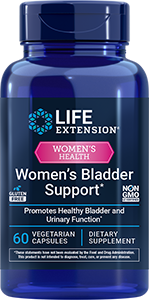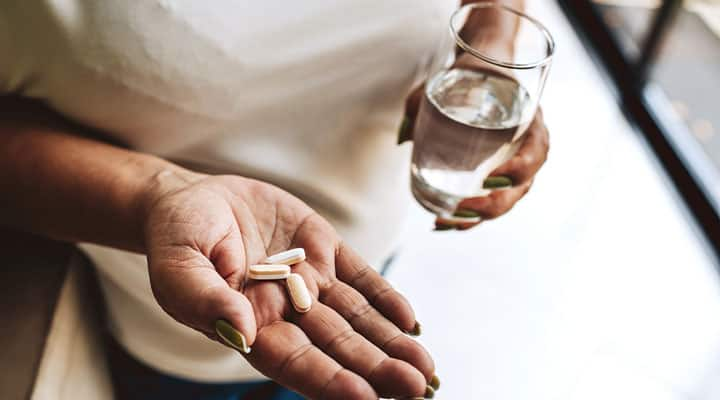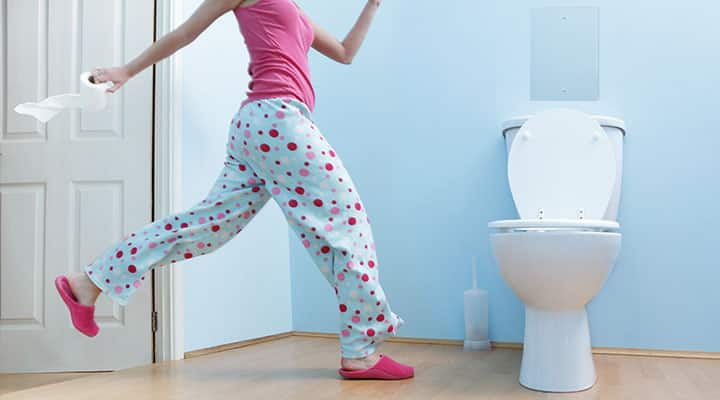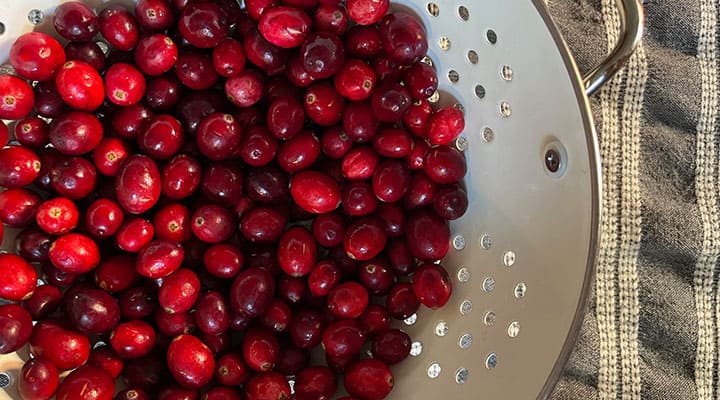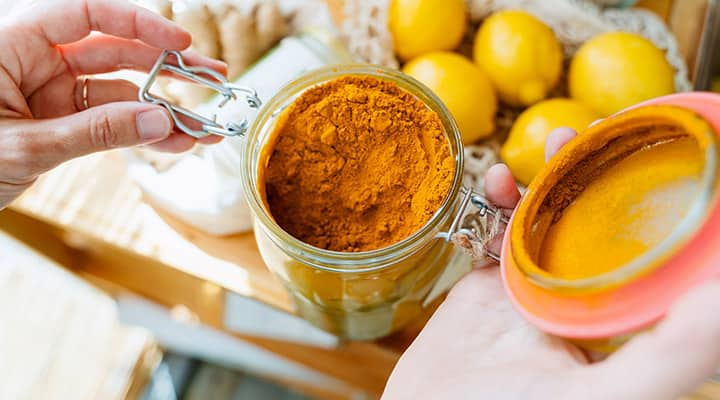
Top Bladder Health Supplements 2025
Published: June 2025
As we make more trips around the sun, we might find ourselves taking more trips to the bathroom, too.
This is because, with normal aging, our muscles start declining in function and strength, and the bladder is primarily a muscle. "It's very elastic and can relax and expand, comfortably holding 300 to 400 mL (10 to 13.5 oz.) of urine, and then contract and empty," says Tracey Seipel, a naturopathic clinician, medical herbalist, formulator and bladder health expert.
Normal aging also affects the pelvic floor muscles, which sit like a hammock in the lower abdomen and hold up your bladder and other organs. This means you might have to visit the loo more often, experience leakage when sneezing or bouncing, or the urge to go might wake you up at night.
Some age-related factors are inevitable in life, but there are ways to help support your bladder over the years. Here's everything you need to know about bladder health supplements.
Can supplements really help with bladder control?
Bladder control is top of mind for millions of people as they age. Women are especially prone to bladder changes over time because the pressure on the pelvic floor during pregnancy and childbirth can stretch those muscles, Dr. Seipel said. Drinking alcohol or caffeine (which are diuretics) can also affect how often you need to run to the restroom.
While staying fit, skipping that second cup of coffee or cocktail, and doing your Kegel exercises can help, many people are turning to targeted supplements for extra support. Supplements aren't a magic fix, but "a quality bladder health supplement can work with the body to support a healthy bladder," Dr. Seipel says.
Certain nutrients and plant-based compounds have been studied for their ability to support bladder muscle tone or help bolster the bladder wall, while others may help relax the bladder muscle, making those urgent "gotta go" moments less frequent. A few ingredients may also help you wake up less frequently at night for the bathroom, giving your body a better chance at uninterrupted sleep.
What ingredients to look for in bladder supplements
Certain plant extracts, nutrients and minerals have been shown to offer targeted support. Here are some of the most well-studied and promising ingredients to look for in a quality bladder supplement:
Horsetail, lindera and three-leaf caper:
Urox® is the name for the patented blend of three herbal extracts: Equisetum arvense (horsetail), Lindera aggregata, and Crateva nurvala (three-leaf caper). A clinical study including 150 women and men found 840 mg of Urox® supported normal urinary frequency, bladder comfort and the ability to maintain healthy urination patterns.Beta-sitosterol:
This plant-based compound is similar in composition to cholesterol. A review of trials including more than 500 men shows that beta-sitosterol helps support bladder comfort and healthy urination in men.Saw palmetto:
An ingredient derived from the Sabal palm, saw palmetto is renowned for supporting a healthy prostate and healthy urination in men. It is also a source of beta-sitosterol.Pygeum extract (bark):
This extract helps support a healthy prostate and healthy urination in men. Research including more than 1,500 men found pygeum extract encouraged healthy urinary frequency.Lycopene:
A well-known antioxidant carotenoid from tomatoes, lycopene supports a healthy prostate for healthy urination, cellular health and a healthy inflammatory response.Boron:
This mineral has been shown to support healthy hormone metabolism as well as a healthy inflammatory response. Research shows that taking boron supports men’s prostate health for healthy urination patterns.Cranberry:
Cranberry juice is a well-known ingredient for women's bladder and urinary tract health, and the fruit's compounds have research to back it up. Studies show that cranberry supports urinary tract health and a healthy bladder.Rye flower pollen:
This nutrient helps support a healthy prostate. Research shows that taking rye flower pollen supports healthy urination in men.Water-soluble pumpkin seed extract:
Pumpkin seed extract supports healthy bladder structure and function, especially as we age.Melatonin:
This naturally occurring hormone encourages healthy, restful sleep. Research shows it can also reduce nighttime urinary frequency.Siberian rhubarb:
For women experiencing the menopausal transition, this extract may be beneficial. A clinical study with 363 women in perimenopause or postmenopause showed Siberian rhubarb extract supported urinary tract health and a healthy bladder.
Explore Our Best Kidney, Bladder, Urinary Health Supplements
What are the benefits of bladder health supplements?
The right combination of nutrients and herbs can work in harmony to promote urinary tract and bladder wellness. Here are the key areas where high-quality supplements can help support bladder health:
Healthy urination and urination patterns.
During the normal aging process, we can sometimes experience frequent urges, sudden leaks, or waking up multiple times a night. If these sound familiar, it might be worth trying a bladder health supplement. The ingredients listed above, especially the Urox® blend of horsetail, lindera, and three-leaf caper, beta-sitosterol, cranberry and rye flower pollen have been shown in clinical studies to support normal urinary frequency, bladder comfort and healthy urination patterns. This can mean fewer interruptions to your day (and your sleep), and a greater sense of ease and confidence.Healthy bladder structure and function.
Behind the scenes, your bladder muscles and tissues expand and contract, helping you hold it in and then let it all out when it's time to go. Ingredients such as water-soluble pumpkin seed extract, saw palmetto, pygeum, lycopene, and boron may help support the physical structure of the bladder and surrounding tissues, promoting strength, tone and healthy function. These benefits are especially important as we age or experience hormonal shifts that can affect urinary health.Fewer nighttime urination interruptions.
Rolling out of bed multiple times a night often means waking up groggy and feeling off the following day. But certain nutrients and plant compounds can help relieve waking at night when it is due to the need to urinate so you can get more restful sleep. Beta-sitosterol and lycopene support healthy prostate function and healthy urination in men, helping cut back on those nighttime bathroom breaks. For women, herbs like horsetail, lindera, and three-leaf caper extracts help support bladder health by promoting healthy urinary frequency and nighttime urination patterns.Bladder lining health.
Your bladder not only holds urine, it also acts as a protective barrier, thanks in large part to the bladder lining. This thin (but important) layer helps protect the underlying tissues. One of the most well-known nutrients for supporting bladder lining health is cranberry. Pumpkin seed extract and Urox® may also help maintain the structural integrity of the bladder.Healthy bladder muscles.
Your bladder muscles need to be strong and flexible enough to store urine comfortably and release it completely when it's time to go. But age-related factors and the body changes that come with pregnancy and menopause can affect the health and strength of those muscles. Research suggests that pumpkin seed extract can help support the primary bladder muscle, encouraging healthy urination patterns. This can be especially helpful for age-related bladder issues. Urox® has also been shown to support bladder function.More bladder comfort.
Healthy urinary frequency means more comfort. These clinically studied ingredients, especially cranberry and Urox®, support healthy urination patterns and can help you feel less burdened by bladder concerns.
How to choose a high-quality bladder support supplement
Choosing a quality supplement can help you get the nutritional support you need. Here are a few key things to look for:
Clean, transparent labels:
A high-quality supplement should clearly list all its active ingredients, even if it uses proprietary blends. Look for supplements that are free from artificial dyes and the major allergens, especially if you have sensitivities.
Clinically studied ingredients and doses:
It's not just what's in the supplement, but also how much. "Look for ingredients that have been shown in published clinical research to support bladder function," Dr. Seipel says. A quality product will use those clinically relevant amounts, rather than sprinkling in ingredients for label appeal. Using clinically effective doses means you have a better chance of seeing results from your supplement.
Third-party testing:
Trustworthy brands often invest in third-party testing to ensure their supplements are pure and accurately labeled. Certifications like NSF, USP, or ConsumerLab offer peace of mind that what's on the label is truly what's in the bottle.
Certificates of Analysis (COA):
Reputable brands provide COAs on request for their products, so you can get to know everything about a supplement—its testing, dosage and more—before you consume it.
Just remember: If you plan to start a new supplement for your urinary tract health, check with your healthcare provider beforehand, especially if you have any medical concerns or are taking medications.
Feeling like the urge to go is bogging you down? Our health needs quiz can deliver personalized supplement recommendations to help support your kidney and bladder health, especially as you age.
About the Author: April Benshosan holds a master's degree in publishing and has been reporting on nutrition, fitness, and health for nearly a decade. Her work has been published in both print and digital outlets, including Women’s Health, EatingWell, SHAPE and more.
References
- Hirsh SP, et al. “Self-Assessed Benefits of a Prostate Health Formulation on Nocturia in Healthy Males With Mild Lower Urinary Tract Symptoms: An Open Label Study.” Glob Adv Health Med. November 2020. https://pubmed.ncbi.nlm.nih.gov/33294303/
- Kaszkin-Bettag M, et al. "Efficacy of the special extract ERr 731 from rhapontic rhubarb for menopausal complaints: a 6-month open observational study." Altern Ther Health Med. November-December 2008. https://pubmed.ncbi.nlm.nih.gov/19043936/
- Batool M, et al. "Nutritional Value, Phytochemical Potential, and Therapeutic Benefits of Pumpkin (Cucurbita sp.)." Plants (Basel). May 2022. https://pmc.ncbi.nlm.nih.gov/articles/PMC9182978/
- Kwon Y. "Use of saw palmetto (Serenoa repens) extract for benign prostatic hyperplasia." Food Sci Biotechnol. April 2019. https://pubmed.ncbi.nlm.nih.gov/31807332/
- Schoendorfer N, et al. "Urox containing concentrated extracts of Crataeva nurvala stem bark, Equisetum arvense stem and Lindera aggregata root, in the treatment of symptoms of overactive bladder and urinary incontinence: a phase 2, randomised, double-blind placebo controlled trial." BMC Complement Altern Med. January 2018. https://pubmed.ncbi.nlm.nih.gov/29385990/
- Shafe MO, et al. "Lycopene: A Potent Antioxidant with Multiple Health Benefits." J Nutr Metab. June 2024. https://pubmed.ncbi.nlm.nih.gov/38883868/
- Sugaya K, et al. "Effects of melatonin and rilmazafone on nocturia in the elderly." J Int Med Res. September-October 2007. https://pubmed.ncbi.nlm.nih.gov/17900408/
- Wilt T, et al. "Beta-sitosterols for benign prostatic hyperplasia." Cochrane Database Syst Rev. 2000. https://pmc.ncbi.nlm.nih.gov/articles/PMC8407049/
- Wilt T, et al. "Pygeum africanum for benign prostatic hyperplasia." Cochrane Database Syst Rev. 2002. https://pubmed.ncbi.nlm.nih.gov/11869585/
- Xiong Z, et al. "Preventive effect of cranberries with high dose of proanthocyanidins on urinary tract infections: a meta-analysis and systematic review." Front Nutr. November 2024. https://pubmed.ncbi.nlm.nih.gov/39668896/
- Yasumoto R, et al. "Clinical evaluation of long-term treatment using cernitin pollen extract in patients with benign prostatic hyperplasia." Clin Ther. January-February 1995. https://pubmed.ncbi.nlm.nih.gov/7538904/
- "Boron." National Institutes of Health. June 2022. https://ods.od.nih.gov/factsheets/Boron-HealthProfessional/
Always be in the know!
Access the latest deals, wellness news, expert health tips & more!

